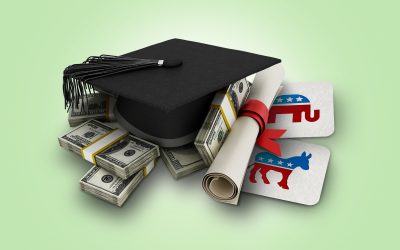
Reforms, Not Revolution, May be Solution to College Debt Crunch
Crisis is the operative word that has focused massive attention on student debt.
The press has stoked the fires by highlighting the growing size of total student debt and featuring poignant stories of out-of-work graduates with massive debt burdens.
Presidential candidate Hillary Clinton has responded with “The New College Compact” that envisions free four-year colleges for families with annual incomes under $85,000; rising to $125,000 by 2021. She also envisions a simplified FAFSA, the form for documenting family income and determining financial need. And she proposes a major opportunity to refinance existing loans at lower rates.
Meanwhile, candidate Donald Trump does not have a formal policy proposal, but his statements oppose debt-free public higher education and propose moving government out of college lending.
While the two presidential candidates have different positions, both call for change to what we do now.
Clinton would direct significant federal financial support to the process and thereby help more people earn college degrees with less debt. Trump’s plan calls for more aggressive oversight as to who gets loans, and a requirement that schools and college share in the risk of students failing to finish, or failing to earn sufficient incomes upon graduation to repay the debt.
Is massive change necessary? Two new books address this “crisis” with care and raise important issues. “Student Debt: Rhetoric and Realities of Higher Education Financing” and “Game of Loans: The Rhetoric and Reality of Student Debt” both chronicle the history and document the current higher education environment. Given the similarity of their subtitles, it is no surprise that their assessments are somewhat similar. They downplay the crisis aspect, while addressing important aspects of the problem.
The authors and I agree that one issue is that families and students are affected unevenly in this area. There are examples of students who graduate with excessive debt and no job prospects. This leads to a perception of a crisis. Worse yet, it leads to uninformed fear of education and its costs. This view leads people to turn away from education and the doors it opens.
There are many more examples of graduates entering the working world with only modest debt, a strong education and success at achieving full-time employment. These books paint a balanced and fair picture. They emphasize that anecdotes chosen to highlight the worst cases cause people to make bad decisions.
Most colleges and universities work hard to provide financial aid for those with the greatest need. They strive to attract a student body that is diverse in many ways, including, gender, ethnicity and economic ability. And as Hillary Clinton suggests we can move to enhance financial aid for those with the most need.
Unfortunately, many students from lower socio-economic backgrounds come from families without experience with college, and study in high schools that lack strong college preparation and advisement opportunities. They do not know that the most able among them can pursue a college education at little or no cost using a combination of PELL and scholarships grants. As a result, they may not pursue a college degree at all, or they may not pursue the path that would provide the most valuable educational experience.
One advantage of the widespread concern about college debt is that many families have changed their decision process and are factoring cost and debt into their decision-making more than in the past. At UConn, we have seen many families choose our public, in-state tuition over higher-cost options. They have acknowledged that they are considering the value of the education. Some families are consciously saying that earning the undergraduate degree at UConn conserves resources that may mean lesser debt, or more money available to pay for graduate school.
Some for-profit higher education institutions have pushed very heavy debt onto students who ultimately neither graduated nor found meaningful employment. The government is forcing them out of the student loan/education business—and this is a relief for all.
Today, high school guidance counselors and families are working hard to be sure they understand this complex marketplace and make wise educational decisions. Philanthropists are providing more scholarship dollars to support able and aspiring students. Colleges and universities, often with pressure from legislatures or boards of trustees, are working to curtail costs and increase efficiency.
Some of the policy interventions under debate in the presidential election will, no doubt, come to pass. These recent books should help journalists, policy makers and voters make more informed decisions about the value of education and the positive role of carefully chosen debt funding in securing that value.

John A. Elliott
Dean, UConn School of Business
John A. Elliott is dean of the UConn School of Business, as well as the Auran J. Fox Chair in Business. John is a certified public accountant with professional experience as an auditor and consultant. His research is concentrated on the role of accounting information in financial analysis and contracts. When not attending his son’s athletic events or visiting his daughter and her family, John and his wife, Laura enjoy travel. John is also an avid fan of the UConn men’s and women’s basketball teams. View Posts